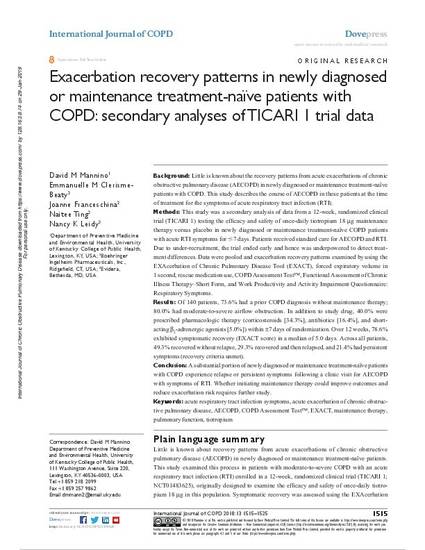
Background: Little is known about the recovery patterns from acute exacerbations of chronic obstructive pulmonary disease (AECOPD) in newly diagnosed or maintenance treatment-naïve patients with COPD. This study describes the course of AECOPD in these patients at the time of treatment for the symptoms of acute respiratory tract infection (RTI).
Methods: This study was a secondary analysis of data from a 12-week, randomized clinical trial (TICARI 1) testing the efficacy and safety of once-daily tiotropium 18 µg maintenance therapy versus placebo in newly diagnosed or maintenance treatment-naïve COPD patients with acute RTI symptoms for ≤7 days. Patients received standard care for AECOPD and RTI. Due to under-recruitment, the trial ended early and hence was underpowered to detect treatment differences. Data were pooled and exacerbation recovery patterns examined by using the EXAcerbation of Chronic Pulmonary Disease Tool (EXACT), forced expiratory volume in 1 second, rescue medication use, COPD Assessment Test™, Functional Assessment of Chronic Illness Therapy-Short Form, and Work Productivity and Activity Impairment Questionnaire: Respiratory Symptoms.
Results: Of 140 patients, 73.6% had a prior COPD diagnosis without maintenance therapy; 80.0% had moderate-to-severe airflow obstruction. In addition to study drug, 40.0% were prescribed pharmacologic therapy (corticosteroids [34.3%], antibiotics [16.4%], and short-acting β2-adrenergic agonists [5.0%]) within ±7 days of randomization. Over 12 weeks, 78.6% exhibited symptomatic recovery (EXACT score) in a median of 5.0 days. Across all patients, 49.3% recovered without relapse, 29.3% recovered and then relapsed, and 21.4% had persistent symptoms (recovery criteria unmet).
Conclusion: A substantial portion of newly diagnosed or maintenance treatment-naïve patients with COPD experience relapse or persistent symptoms following a clinic visit for AECOPD with symptoms of RTI. Whether initiating maintenance therapy could improve outcomes and reduce exacerbation risk requires further study.
DMM reports personal fees from Boehringer Ingelheim during the conduct of the study. He reports grants from Boehringer Ingelheim, GlaxoSmithKline, and Novartis; personal fees from Amgen, AstraZeneca, Boehringer Ingelheim, Forest, GlaxoSmithKline, Merck, Novartis, Schlesinger Law Firm, and Up to Date and other support from the COPD Foundation, outside the submitted work.
Available at: http://works.bepress.com/david_mannino/278/

Published in International Journal of COPD, v. 13, p. 1515-1525.
© 2018 Mannino et al.
This work is published and licensed by Dove Medical Press Limited. The full terms of this license are available at https://www.dovepress.com/terms.php and incorporate the Creative Commons Attribution - Non Commercial (unported, v3.0) License. By accessing the work you hereby accept the Terms. Non-commercial uses of the work are permitted without any further permission from Dove Medical Press Limited, provided the work is properly attributed. For permission for commercial use of this work, please see paragraphs 4.2 and 5 of our Terms.